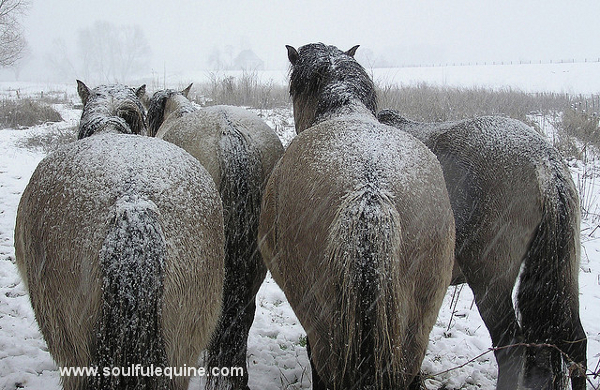
During certain times of the year, dramatic weather changes can occur quickly. One day it’s beautiful, 71 degrees and sunny, and the next day there’s a drastic 40 degree drop in the temperature.
That happened here in Texas over Christmas in 2009. A drastic drop in the barometric pressure started to occur the day before Christmas Eve. On Christmas Eve day a blizzard blew in bringing a heavy snow/rain and sleet mix with 45 mph winds. For a native Texan, it was miserable.
Drastic weather changes can cause problems for both your horse and you. When the barometer drops dramatically prior to a big storm, some horses, as well as people, can experience ill effects.
To my knowledge, there’s no documented proof that there’s a correlation between weather and physical problems in horses; however, it has been shown that a link exists between barometric pressure and headaches in humans.
Additionally, some people consistently have a flare up of physical ailments such as TMJ, knee pain, or back pain, and we can all be more susceptible to a cold or flu bug.
For horses, some may experience mild to severe colic during a sudden barometric pressure drop when a cold front is coming through. Some people may believe that’s a myth, but just for fun give your nearest vet clinic a call the day after a drastic weather change in your area and politely ask if they would share with you how many colics were reported the day of the drop.
One vet clinic I spoke with in the area reported that one of their vets had 4 farm calls for colic and two horses that had to go in for surgery that day. I find this interesting. Just think of how many other vets had similar experiences.
Some people feel that it’s due to a lack of water consumption, and that may be true; however, I believe it’s not necessarily the barometric drop that causes these types of problems, but rather that it’s helping to point out an underlying issue.
Some horses are more sensitive than others to weather changes. Unfortunately, there’s not much we can do about this.
A few ideas…
- Keep your horse in a more natural environment to allow free movement.
- Provide a good quality probiotic when you know changes in the weather will be approaching.
- If the weather is drastically changing or is about to change, avoid making modifications that might stress the horse in any way including diet, housing, or exercise.
- Make sure your horse is drinking enough water and is not showing a change in her eating patterns.
- Keep a close eye out for any sudden changes in your horse’s behavior including symptoms of colic.
- Keep a healthy maintenance program in place, and try to eliminate as many other causes of colic that you can.
- One of the biggest causes of colic is high parasite loads. Do fecal checks so you know your horse’s parasite load patterns. See the Parasite Resistance in Horses and Chemical Deworming article for more information.
This subject may seem like common sense, but it’s worth pointing out that there could be a possible correlation between your horse’s health and certain weather patterns.
If, Heaven forbid, something does happen to your horse in such a situation, take a closer look at what the underlying cause may be.”
The weather was more than likely the “straw that broke the camel’s back,” so to speak, and may be a warning of an underlying problem that was possibly overlooked.
I’d love to hear an experience you’ve had with your horse when the barometric pressure made a radical change. Send me an email through our contact form to share your story.
Keep it soulful,
Stephanie Krahl
###
Photo Credit – original photo modified in size and to include the Soulful Equine URL
